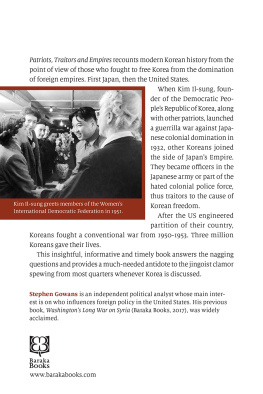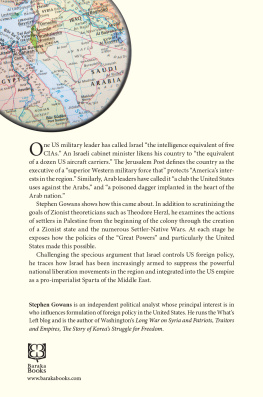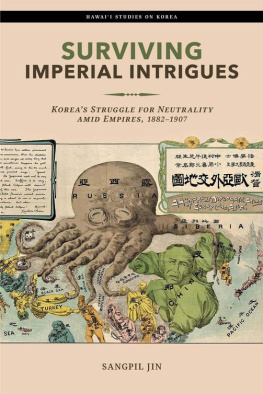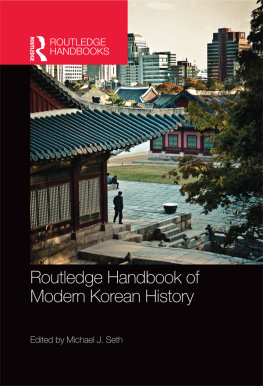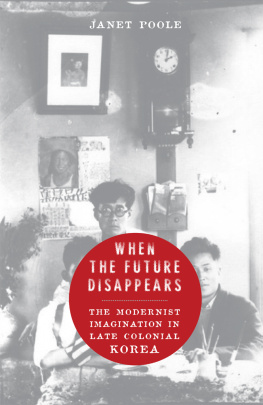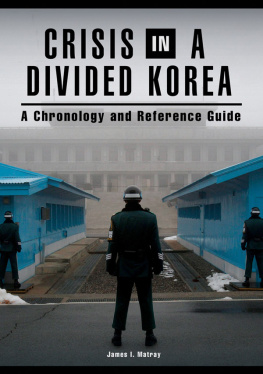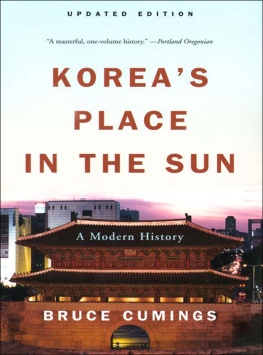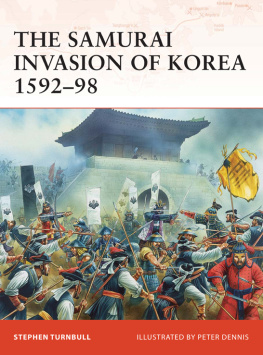The Koreans have as little use for an American Korea as they had for a Japanese one. They want a Korean Korea.
INTRODUCTION
One CountryTwo States
There are not two but three Koreas North,
South and the American military bases.
William R. Polk
There is only one Korea, but there are two Korean states. One, the Democratic Peoples Republic of Korea (DPRK), or North Korea, controls territory in the northern part of the peninsular country. The other state, the Republic of Korea (ROK), or South Korea, controls territory in the southern part. Both states claim sovereignty over all of the country and regard the other as illegitimately occupying territory over which it has jurisdiction by right. Neither state, then, regards the de facto border that separates them as an international frontier. On the contrary, they see the border, the so-called demilitarized zone, or DMZ, as a cease-fire line only, marking the dividing line between the two states at the end of the Korean War.
To signal that there is only one Korea, the DPRK is sometimes referred to as north Korea, with north in lower case, and its rival the ROK as lowercase south Korea. While Im sympathetic to this protocol, Ive opted to use the names North Korea and South Korea as informal synonyms of the DPRK and the ROK respectively, in keeping with conventional usage in the Western world. At the same time, I use these informal names to denote states within a single country, and not to designate two separate nations. While this may seem pedantic to some, the distinction is a useful one in understanding the intra-Korean conflict of 1950 to 1953 which has become known, outside of Korea, as the Korean War, but inside the country either as the 6.25 War or the Great Fatherland Liberation War, depending on which side of the DMZ youre on.
The two states can also be distinguished by two politically descriptive appellations: the patriot state, in the case of the DPRK, and the traitor state, in the case of the ROK. The DPRK was founded by Korean patriots who spent over a decade fighting for the liberation of Korea from Japanese domination. Japans colonial rule over Korea began formally in 1910, and informally five years earlier, when Tokyo declared Korea a protectorate. When the Japanese empire collapsed at the end of the Pacific War in 1945, the DPRKs future founders insisted that Koreans organize their own affairs, without foreign interference. In other words, they demanded independence after four decades of foreign rule. The demand for liberty, no different from that of any other colonial people, represented the sentiment of virtually every Korean, and has lived on from generation to generation in the political program of the DPRK, which seeks to free Korea from domination by Japans successor as foreign hegemon, the United States.
For the first two decades of its existence, the South Korean state was staffed at its highest levels by quislingsKoreans who had collaborated with the Japanese, including serving in the Japanese military and the colonial police. Some even took Japanese names. One quisling, who would later become president, beamed at the memory of receiving a gold watch from Japans Emperor Hirohito, for services to the empireservices which included suppressing the guerrilla war waged by his compatriots to win manumission from Japanese domination. When US forces arrived on the peninsula in 1945, they recruited every Japanese hireling they could find to run their new anti-communist state on the Korean peninsula.
At the conclusion of the Pacific War, the war in the Pacific theater within the larger global conflict that was World War II, Koreans looked to the Soviet Union for inspiration. The Bolshevik Revolution in 1917 had inaugurated the anti-colonial movement, and the Bolsheviks inspired the wretched of the earth to emancipate themselves, a project to which the Soviet Union contributed admirably. Across the globe, communism resonated with oppressed peoples. It no less resonated with Kim Il-sung, the founder of the DPRK, a charismatic anti-Japanese guerrilla leader who would very likely have won the national elections planned by the United States and Soviet Union for post-World War II Korea had Washington not scuttled them in favor of elections held within its own occupation zone, whose outcome it could control. The United States blocked the creation of an independent, unified (and very likely communist) Korean state, by creating an alternative state every bit as deserving of the obloquy puppet state as was Manchukuo, the state created by Japan in neighboring Manchuria in 1932 under the nominal leadership of the Chinese and actual leadership of the Japanese. The traitors Washington recruited to staff its puppet state served as the public face of the Republic of Korea. They were advised behind the scenes by a coterie of US officials, the most important of which were the US ambassador, the CIA station chief, and the top US military official in Korea, the latter of whom had (and continues to have) operational control of the ROK military. The quislings participated in the political partition of Korea to thwart the achievement of their compatriots left-wing political aspirations, fought an anti-insurgency war in the south to crush left-wing guerrillas, accepted the occupation of the Korean peninsula by US troops, and acceded to their own militarys subordination to US command.
Korea has long struggled for freedom, from Japanese control in the first half of the twentieth century, and subsequently from US domination from 1945 to today. This is the story of the patriots who have fought for independence and of the empire-builders and traitors who have opposed them.
* * *
As a nation, Korea has existed for over a thousand years, within clearly delineated and recognized borders. That observation was made in connection with the reasons North Korea believed it needed nuclear weapons, namely, to defend itself against the depredations of great powers, in particular, against the greatest power of all, the United States.
Geographically attached to China, Korea was a tributary of the much larger country. It became the object of the First Sino-Japanese Wara conflict fought in the waning years of the nineteenth century between the dominant East Asian power and an emerging one, Japan, for influence in Korea. Japan emerged victorious, and soon after fought Russia, a Eurasian juggernaut, for control of Korea and the contiguous Chinese province of Manchuria, a war occasionally referred to as World War 0. Japan emerged victorious from its contest with the Tsars empire, to the consternation of Europe, for a non-white race had defeated for the first time a great power, in a global international order that theretofore had been characterized by unalloyed white supremacy. (East Asia would soon be menaced by another sort of racial supremacythat of the Yamato, or ethnic Japanese, who would seek to lead a great Asian family, in which Koreans would be reduced to the status of adolescents to be taken in hand and guided by the soi-disant superior Japanese.) Soon after, Japan abolished Korea as an independent country, renamed it Chosen, and integrated it into its rapidly expanding Empire of the Rising Sun. By the close of the First World War, Japan had built an empire which, apart from Korea, included Taiwan, a chain of Pacific islands, the southern half of Sakhalin, and privileges in the semi-colony of China.
With the Japanese empires defeat in the Pacific War in 1945, the United States, newly emerged as the worlds greatest power, and an empire itself (if undeclared), established its own presence on the Korean peninsula, bisecting Korea into separate US and Soviet occupation zones, as a temporary measure (it was said) to accept the Japanese surrender. However, by 1947, the growing strength of communist forces in East Asia convinced US officials that withdrawal from Korea would allow emancipatory movements in the region to flourish. US officials had no interest in encouraging movements which fought to overthrow colonial oppression and to bring an end to the exploitation of man by man. On the contrary, they were more interested in replacing the chains of European and Japanese colonialism with the fetters of US imperialism.

